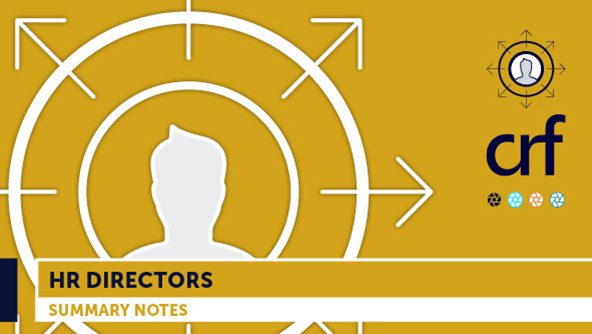Future of Work and People Strategy
Five Imperatives for HR in 2022
The past two years have tested organisations and their HR functions in ways most of us had never experienced before. As we launch CRF’s 2022 programme of research and events, we reflect on five key challenges HR must embrace in 2022 in order to drive organisational performance in what will continue to be turbulent times.
- Creating the conditions for growth and innovation
Our priority as HR professionals is to help the organisation achieve its business goals around growth and renewal. We do this in two key ways: by making sure we have the right people with the capabilities to execute the business strategy. But more importantly – and often underplayed – by creating an organisation context that supports high performance and innovation. What are the defining characteristics of such cultures? First, there’s an openness to embrace uncertainty and harness it as an opportunity to experiment, learn and grow. Second, there’s an intense focus on the customer, putting customer needs at the centre of decision making and making sure the voice of the customer is clearly heard. Finally, it involves fostering an inclusive environment that enables people, regardless of background, characteristics or ways of thinking, to work effectively together and perform to their highest potential. Reflecting on our achievements in 2021 and preparing for 2022, it’s an opportunity to ask: what am I as an HR professional doing to create and sustain an environment that supports innovation and growth?
2022 CRF POST MEETING NOTES:
Innovation: Growth from Uncertainty
With Nathan Furr, Mike Straw and Hamish Taylor
- Designing the organisation for agility
Setting organisations up for success in a dynamic business environment requires them to be designed and configured in ways that enable people to make faster and better decisions. Large complex organisations have to master a core tension to balance agility – being adaptable and responsive to customer needs – and economies of scale. While organisations may historically have made trade-offs between these two polarities, they now can’t afford to sacrifice either. Organisations need to be designed in ways that achieve both agility and scale at the same time.
This means making informed choices about which activities to devolve to local markets in order to stimulate innovation and drive customer responsiveness, and which should be centrally led to achieve specialisation and scale. Three key elements of organisation design can help resolve this tension:- Building networks and lateral connections that cut across structural boundaries.
- Fostering an ‘enterprise mindset’ that puts the longer-term needs of the organisation ahead of the immediate concerns of business units or functions.
- Rethinking the role of the centre so it becomes an enabler that builds expertise and fosters connections across silos, not just an overhead.
Organisation design is often an underdeveloped capability for HR. However, HR has an opportunity to play a leading role in building expertise and making sure leaders give sufficient attention to organisation design when determining strategy and implementing change.
2022 CRF EVENT:
Organisation Design for Agility
With Amy Kates
- Embedding new working practices
As the ‘new world of work’ shifts from being a future issue to being the present for businesses, we need to take stock of what’s working and what needs a rethink. As models of remote and hybrid working bed in, we need to widen the conversation to understand the longer-term impact on business performance, organisational culture, learning and employee engagement.
Questions we need to answer in 2022 include:- How effective are hybrid working strategies? How can we mitigate the challenges and compromises inherent in the new working models?
- What is the longer-term impact of hybrid working on productivity and performance?
- In what ways are organisation cultures evolving, and are those outcomes desirable or counter-productive? How can we positively influence organisational culture when employees are more dispersed?
- Has the rate of learning increased or decreased? How can we explicitly design work to facilitate learning, particularly for those who are at the early stages of their careers?
- What are the longer-term effects of the new working models on inclusion and employee wellbeing?
2022 CRF POST MEETING NOTES:
The Realities of the New Working Environment
With Ravin Jesuthasan and John Whelan
- Developing a learning culture
Learning, both at the individual and organisational level, is the foundation for innovation and growth. It also sits at the heart of organisation transformation: developing a future-fit workforce will require significant investment in reskilling, which requires both formal learning and the opportunity to practise new skills on-the-job.
Corporate learning is becoming increasingly technology-driven. However, technology alone will not get us where we need to be. It needs to be underpinned by a culture of continuous learning, where the organisation climate and leadership behaviours support development. Actions that organisations can take to build and sustain a learning culture include:- Joining up the dots between business strategy, learning, deployment and career development so future capabilities are identified and developed.
- Signalling to employees what the business strategy means in terms of valued future skills, and nudging people to develop skills that will both ensure their future employability and help the organisation grow.
- Supporting employees in determining their own future by putting learning and career support tools and access to career opportunities in their hands.
- Upskilling line managers to have good career conversations and help their teams navigate learning opportunities in the organisation.
- Leadership role-modelling is important, for example taking part in reverse mentoring to learn new skills. However, it’s essential that what leaders say is backed up by action. A common barrier is talent hoarding. Developmental cultures tend to be backed up with an expectation that leaders facilitate internal mobility, and are prepared to give up their best performers to support their development.
2022 CRF EVENT:
The Future of Learning
With Tony O’Driscoll
- Learning how to influence with data
Data is often hailed as the ‘future of HR’. In reality it has always been a part of HR – the function just hasn’t always been as skilled as it could be in using it. The challenge is to harness the power of data to find the answers to business problems such as how to improve productivity or increase customer satisfaction, not just to fulfil HR reporting requirements. Indeed, the most successful people analytics interventions typically combine business, people and organisational data.
To become expert in influencing with data, HR needs to become skilled not only in technical areas such as data analysis and interpretation. It must also develop deeper commercial awareness to identify critical business issues where people analytics can add value. It’s also about focusing on actionable insights: making sure the analysis identifies tangible actions the business can take to improve performance. It also means becoming adept at convincing leaders to act on what the data is saying, through data visualisation, storytelling and influencing skills.
2022 CRF POST MEETING NOTES:
Persuasive Analytics: Influencing with Data
With Nick Holley and Iain McKendrick
CRF’s 2022 programme will address these five questions, as well as other contemporary topics that are relevant to business-focused HR functions. More information about our research and events is available here.





